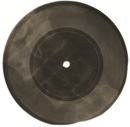Welcome to the home of Latvia’s no.1 act in classic Rock & Roll, 50's style!Pete Anderson is indisputable king of 50’s American rock’n’roll in
Latvia, living legend, walking encyclopedia of American roots music. According to the research made by most authoritative expert on Soviet rock, famous music journalist Artemy Troicky, author of the book called “Back In The USSR, The True Story Of Rock In Russia” (Omnibus Press, 1987), Pete was the very first true rocker in the entire former Soviet Union.
Pete's album "Brass-A-Billy" is acknowledged by the "JUST PLAIN FOLKS" (JPF) - the biggest music organization in the world today, as
“THE WINNER OF JPF MUSIC AWARDS FOR THE BEST ROCKABILLY ALBUM 2009 (Nashville, TN)" –
www.jpfolks.com.
For decades, the Soviet government tried to seal off its people inside a cultural iron curtain. Western radio broadcasts were jammed by KGB with specially generated noises. Western rock music and other forms of art were strictly banned, controlled by censorship and KGB and criticized in a press. Music records and books brought in by rare traveler from the West could be easily confiscated at the border without any explanation.
Nevertheless, the music and its message always seeped through. This process began with radio and records. So-called records “
on bones” or “on ribs” appeared. These were self-made record copies from the real American rock’n’roll vinyl records manufactured at the illegal underground shops somewhere in
Leningrad with the help of special copying devices. Each copy contained just one piece of music and the material for those records was used X-ray film. On the record you could often see the bones or other inner organs of medical patients being x-rayed. “On bones” records were sold on the black market. It’s obvious that all the entertainers’ names and titles of the songs were anonymous for the listener. But anyway, that was the only source of invaluable musical information at those times. You could only guess a hundred times: “Is this Elvis Presley?” Unfortunately records on films used to wear out very fast, soon after some six or seven days of intense playing you had to throw them away because of the holes that appeared on the films from the record players’ needle. Underground businessmen soon were arrested and sentenced to jail.
Later with the advent of the tape recorder, it finally became possible to record short pieces of music from the radio on tape and listen to them later on again and again, to re-record and spread them all over among friends.
The true „Cultural Revolution” began with that! Even the „Iron Curtain” was unable to stop the process!







